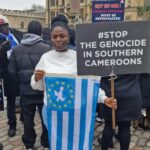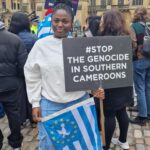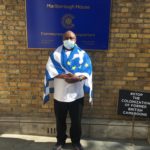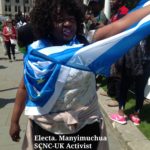Human Rights Violations in Southern Cameroon(Ambazonia)
Human rights are rights inherent to all human beings, regardless of race, sex, nationality, ethnicity, language, religion, or any other status. Human rights include the right to life and liberty, freedom from slavery and torture, freedom of opinion and expression, the right to work and education, and many more. Everyone is entitled to these rights, without discrimination.
International human rights law lays down the obligations which Governments must comply to or to refrain from certain acts, in order to promote and protect human rights and fundamental freedoms of individuals or groups.
One of the greatest achievements of the United Nations has been to define a broad range of internationally accepted rights, including civil, cultural, economic, political and social rights, also encompassing specific standards for women, children, persons with disabilities, minorities and other vulnerable groups against discrimination, alongside established mechanisms to promote and protect these rights and to assist states in carrying out their responsibilities.
It is notable that Cameroon is a contracting state party to a number of international and regional human rights law instruments that are relevant for purposes of human rights abuses. The Cameroon Constitution contains the traditional fundamental rights, freedoms and protection. This includes the right to life, liberty and security of persons, the prohibition of torture or cruel, inhumane or degrading treatment or punishment, fair trial protection before the law and non-discrimination and the prohibition of arbitrary arrest, detention or exile. Under the Cameroonian Constitution, international law retains primacy over national laws.
In as much as the Constitution of the Republic of Cameroon, Rules 144(5) and 132(4) from Rules of Procedure clearly makes provision for the violation of Human Rights, the peaceful protests promoted by the Cameroon Anglophone Civil Society Consortium against the marginalization of Cameroon’s Anglophone regions by Cameroon´s Government in 2016 was suppressed with extreme violence by the state authorities, thereby fuelling support for separatism. The armed conflict, ongoing since 2017, has killed thousands of people and led to a full-blown humanitarian crisis in Cameroon’s Anglophone regions; To date, more than 3 000 civilians and hundreds of members of the security forces have lost their lives; the ongoing conflict in Cameroon has internally displaced over 1 million people; over 2, 2 million people require humanitarian assistance and over 66 000 people have sought refuge in neighbouring Nigeria; Cameroon hosts more than 447 000 refugees and asylum seekers as a result the spill over of this crisis affecting the West and Littoral regions. Cameroon’s English speaking regions have suffered gross human right violations by the Cameroon government as they have shown consistent disregard to human rights laws and have repeatedly refused to implement international human rights judgment in favour of Anglophones.
The current violence in the Northwest and Southwest regions in Cameroon cannot be properly comprehended outside of the historical context in which it has arisen as it is a deeply rooted problem.The British governmentthrough its Voluntary Services Overseas (VSO) Organization significantly participated in and co-shaped Cameroon’s socio-politics and culture till 2014 when they withdrew just two years before the conflict broke out. The continuous relationships from colonialism into present has arguably created a moral duty for the British state to help resolve the Anglophone Crisis in Cameroon. It is noted that, considering the gravity of the human rights abuses that have been committed during this crisis, the international community including the United Kingdom has been lacklustre.
Various treaty bodies and of the United Nations have condemned the ongoing violations of human rights especially in the Southwest and Northwest regions of Cameroon over the decades. These violations have included a pattern of torture perpetrated by French Cameroonian security forces; arbitrary arrest extrajudicial killings including women, children and disabled persons; enforced disappearances and incommunicado detention. All these violations have been documented by United Nations Committee Against Torture (CAT.) and UN Human Rights Committee (HRC). The committee has been specific on the elimination of all forms of Racial Discrimination and has noted its concerns with reports on the inequality of rights that exists between the English and French speaking populations. The following are links to several pictures and videos for more information.
https://www.europarl.europa.eu/doceo/document/B-9-2021-0573_EN.htmlhttps://m.facebook.com/story.php?story_fbid=4840878992635779&id=100001411785290&sfnsn=scwspwa , https://mimimefoinfos.com/anglophone-crisis-military-killed-burned-in-mbengwi-chrda-co-conclude/
Human Rights Watch have reported several incommunicado detentions and torture of people suspected of having ties to armed separatist groups at the state Defence Secretariat (Secretariat d”Etat a la defense,SED) prison in Yaounde. Gendarmes and other security personnel at the SED used torture, including severe beatings and near-drowning as well as other ill-treatment to force suspects to confess to crimes or to mortify and penalize them. Amnesty International, Aljazeera have all reported widespread human rights abuses.
The list extends with the most recent one on the assassination of the Senator in Bamenda Barrister Henry Kemende, because he dared to ask pertinent questions about the government. Sadly, though President Paul Biya keeps signing ratified protocols on Human Rights, he still kills and even burns his people in their homes
Unfortunately, not enough has been done to stop all these atrocities as English speaking Cameroonians have been robbed of their essentiality and dignity, their economic systems have been torn down and we are being humiliated in our birth land.
Dialogue is a precondition for peace, and President Paul Biya’s government has consistently rejected direct talks with any separatist leaders from the Anglophone regions and convened a monologue on September 30th and 4th of October.
The rule of law is not being upheld by the state of Cameroon as the country´s judiciary system is primarily filled with corruption and is politically influenced by the president as he appoints judges and dismisses them at will and as such, they are forced to do what the government wants.
Civilians are tried in military courts using the 2014 anti-terrorism law and some are given dead sentences. These military trial proceedings are marred by serious substantive and procedural defects, in which the presumption of innocence, the right to adequate defense, and the independence of proceedings of the judiciary in general are all seriously undermined. Examples of such a trials are the cases of Fomusoh and two of his friends who were sentenced for sharing an SMS joke and most recently Antionette Kongso who was also arrested simply because she was an ex-partner of a Separatist General “No pity´´. She was arrested while pregnant and actually gave birth while in prison.
https://mimimefoinfos.com/bamenda-four-persons-arrested-by-soldiers-remain-unaccounted-a-week-later/
About 58% of Anglophones arrested have not been tried and might not even get a trial whereas President Paul Biya has been granting clemency for prisoners but many of the detainees currently held in pre-trial detention in relation to the Anglophone crises won’t benefit from it. Overcrowded prisons with poor access to Healthcare and dire living conditions and approximately a doctor per 2000prisoners.Inmates are malnourished and most of them are sick with tuberculosis. Notwithstanding the additional vulnerabilities created by the COVID -19 Pandemic. Many detainees have died in custody due to the harsh living conditions
https://m.facebook.com/story.php?story_fbid=4840878992635779&id=100001411785290&sfnsn=scwspw
Clashes between Anglophone separatist armed groups and government security forces are increasing in frequency and severity. Humanitarian aid has also been heavily disrupted in the affected regions due to non-state armed groups and lockdown measures, leaving people in those regions out of food supply and depriving tens of thousands of people access to vital healthcare. Few exceptions to the lockdown measures were granted on humanitarian grounds and, as a result, aid disbursement was significantly disrupted and UN agencies have been forced to suspend humanitarian activities, notwithstanding the additional vulnerabilities created by the COVID-19 pandemic;
Civilians are bearing the brunt of the violence whereas government and separatist forces are continuously perpetrating reprisal attacks against one another, intentionally targeting civilians; the government forces have continuously carried out extrajudicial killings of civilians, including women and children with torture and ill-treatment, committing sexual violence, including rape, gender-based violence, destroyed and looted properties, including villages, homes, health facilities and hospitals, arrested and detained citizens arbitrarily, all as a result of hostilities or presumed collaboration with separatists. Also, in the first five months of 2021, armed separatists carried out at least 27 attacks with explosive devices in 13 towns, more than in all previous years of the crisis combined and have raped, killed, tortured, violently assaulted, threatened and kidnapped hundreds of people, including women, humanitarian workers, teachers and children, presumed to have been collaborating with the military.
The conflict has had a heavy impact on children, with 700 000 students having been deprived of their right to education due to forced school boycotts across the Anglophone regions. As of August 2021, children in Cameroon make up 28 % of all survivors of gender-based violence and face a higher risk of child recruitment, child labour, and child abuse, and over 50 % of children in the country have reportedly been abused. According to the UN Population Fund, 38 % of women in Cameroon aged 20-24 were married before the age of 18 and 13 % were married before the age of 15.
The signature of the presidential decrees providing for the transfer of competencies and the gradual transfer of human and financial resources to the decentralized authorities for the concrete implementation of the decentralization process is pending; despite the special status granted to the Anglophones.
The government continues to restrict the freedoms of expression and association and has become increasingly intolerant of political dissent, hundreds of opposition party members and supporters were arrested following demonstrations calling for a peaceful solution to the crisis in the Anglophone regions. Also, restrictions are persistently placed on political opponents, protestors, journalists, and civil society;
The Cameroon government forces are unable to effectively protect the affected population, but kill and torture its own people which they have a national duty to protect.
Various organizations and countries have given recommendations on how this conflict can be resolved but the Cameroon authorities are adamant and uncompromising. For instance, on the 23rd of November 2021, the European Parliament proposed a motion for a resolution on the human rights situation in Cameroon. Another exhaustive report was done by The University of Oxford(Faculty of Law)
In conclusion, our concerns as Southern Cameroonians are well documented. The British have a role to play in assisting and aiding to resolve this crisis and justice to be given to all who are guilty for committing atrocious crimes against humanity.

Written By: Emilia Efeti Agey
SCNC UK









